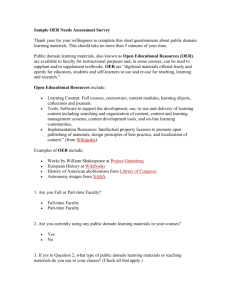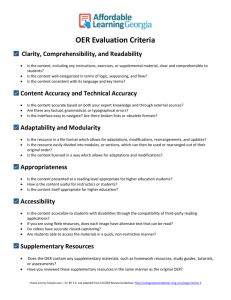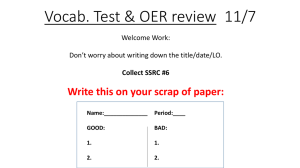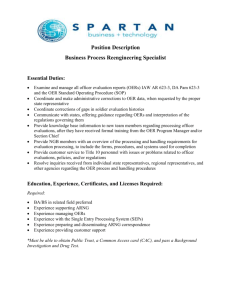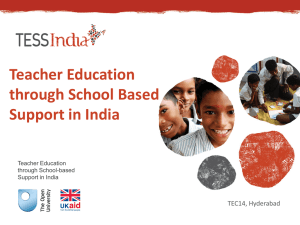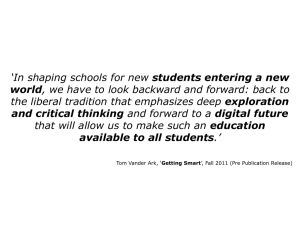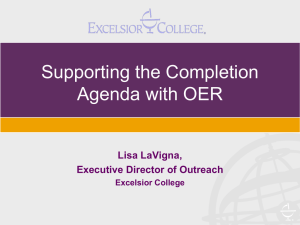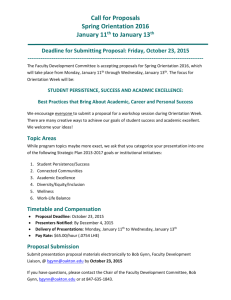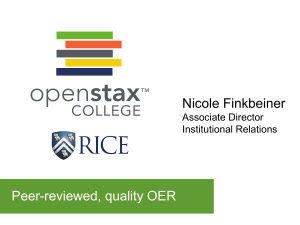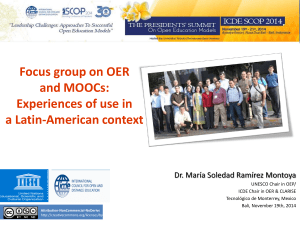OERAccessServices
advertisement
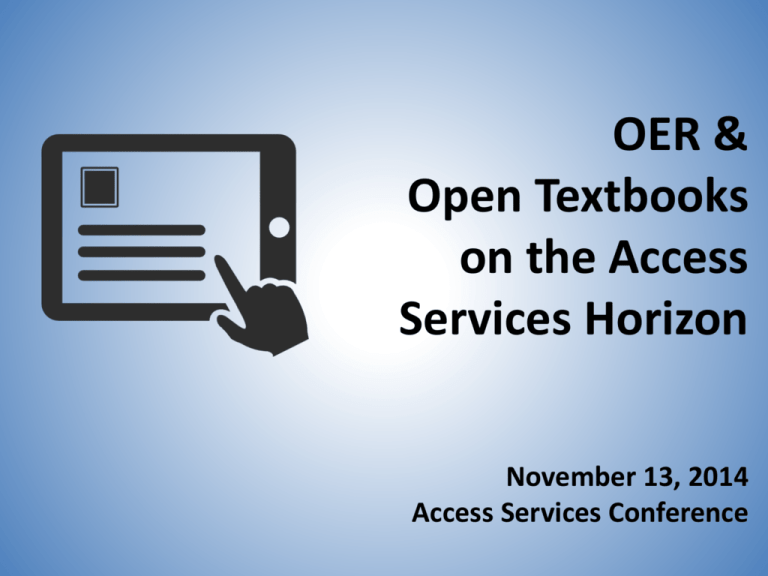
OER & Open Textbooks on the Access Services Horizon November 13, 2014 Access Services Conference Tucker Taylor Head of Circulation University of South Carolina (Columbia) Jeff Gallant Affordable Learning Georgia Visiting Program Officer for OER Board of Regents of the University System of Georgia Textbook Costs Costs to Students • • • • Tuition Housing Food/Clothing/Living Textbooks • Textbooks are the one cost you can control Effects on Students • • • • • 60% do not purchase 35% took fewer classes 31% chose not to register for a class 14% dropped 23% regularly go without • Source- student survey by Florida Virtual Campus, 2012 http://www.openaccesstextbooks.org/%5Cpdf%5C2012_Florida_Student_Tex tbook_Survey.pdf South Carolina • • • • • • • • • • • • • USC Upstate Coker Winthrop USC Clemson Coastal Furman Piedmont Tech College of Charleston Charleston Southern Denmark Tech Voorhees Midlands Tech $800-1,200 $1,000 $1,000 $1,008 $1,138 $1,147 $1,200 $1,200 $1,207 $1,400 $1,500 $1,500 $1,632 Cost to USC Freshman • Typical Freshman Semester – English 101 – Biology 101 – Math 141 – Spanish 121 $98 $367 plus an optional $230 textbook $231 $213 • Criminal Justice $238 USC • $1377 Your first semester of textbooks • 190 hours of minimum wage work – Chemistry 111 • $174 plus an optional $476 package What are Libraries Doing? • Nothing • Lending and ILL-ing textbooks • Reserve textbooks University of South Carolina • • • • 2008 100 students or more 20,000-25,000 per year 1000+ textbooks Circulation Statistics Problems • • • • • • • Meeting the need Perception Cost Lack of e-book availability Fear of Promotion Band-aid Perpetuation of a bad system Jeff Gallant jeff.gallant@usg.edu www.affordablelearninggeorgia.org No, seriously, send me an email! What is an Open Educational Resource (OER)? First, you must know what we mean by “Open…” What is an OER? A resource is open if you can: • Access it at no cost • Share it with no restrictions • Transform it into something new • Adapt it for your particular audience What is “Open?” A resource is not open if: • There is no way to access it without cost • Sharing is either prohibited or inhibited • Transformation and adaptation are not allowed What isn’t “Open?” How do resources become open? Unless a work is in the public domain by law, resources are made open through open licensing. Open licenses give permission to access, share, and adapt a resource. For OER, we typically use Creative Commons open licenses. Open Licensing Image courtesy of foter.com, CC-BY-SA 3.0 Therefore: An Open Educational Resource is any educational resource that is accessible, modifiable, adaptable, and shareable: • Open Textbooks • Open Assessments (tests, quizzes) • Open Courseware • Open Audiovisual Materials OER Formats + The OER “Wild West” With OER, authority is always shared. OER Evaluation Types of OER review methods: • Editorial Review • Double-Blind Peer Review • Faculty Review (Amazon-esque) • Subject Expert Review • No Review OER Reviews Affordable Learning Georgia’s OER Evaluation Criteria 1. 2. 3. 4. 5. 6. Clarity, Comprehensibility, and Readability Content Accuracy and Technical Accuracy Adaptability and Modularity Appropriateness of Material Accessibility Quality of Supplementary Resources OER Evaluation What is Affordable Learning Georgia? Programs to support more affordable learning materials, including campus advocacy, faculty development, bookstore collaborations, and grants for textbook transformation. A website designed to be a one-stop service to help University System of Georgia (USG) faculty and staff identify lower-cost, electronic, free, and open educational resources (OER), building on the cost-effective subscription resources provided by GALILEO and the USG libraries. www.affordablelearninggeorgia.org An initiative of the University System of Georgia and GALILEO, Georgia’s Virtual Library. www.galileo.usg.edu Affordable Learning Georgia Is… Goals and Programs: • OER for Top Fifty Courses • OER for eCore • USG online core curriculum • Partnerships for scale and quality (CSU, OpenStax, eCore) • Bookstore program • Symposium on the Future of the Textbook • Textbook Transformation Grants ACTIVITIES AND STRATEGIES Why Grants? Adoption, adaptation, and creation take time. Faculty often lack the time to do this alone. Textbook Transformation Grants allow for: • Course releases or extra-workload compensation for faculty • Assistance from instructional designers • Support for training session travel Why Grants? Vector art designed by Freepik: http://www.freepik.com/free-vector/simplesmall-icon-vector-material_575034.htm External Project Impact • Shared evaluations • Sustainability measures • Shared creations and adaptations • Lessons learned • RPG statistics • Student savings Why Grants? Vector art designed by Freepik: http://www.freepik.com/free-vector/simplesmall-icon-vector-material_575034.htm Summary of Round One Grants and Grantees • 48 proposals from 19 institutions; 30 awarded • 64 participants • $314,590 awarded • $2,206,138 in potential savings to students annually • 19 Top 50 courses addressed • Spring 2015: Semester offered to Students Round One Textbook Transformation Grants RPG = Retention Progression Graduation New formula funding model in FY16 for USG from General Assembly will take this into account. Research on OER and RPG measures are new and ongoing, but recent case studies are promising. Retention, Progression, Graduation About 66% of instructional faculty surveyed by Babson in 2014 were not aware of OER. This goes to 80% if you include “somewhat aware.” Part of an infographic by Babson Survey Research Group and Pearson, CC-BY 4.0: http://www.onlinelearningsurvey.com/repor ts/openingthecurriculum2014infographic.pdf OER: Awareness Wanted Part of an infographic by Babson Survey Research Group and Pearson, CC-BY 4.0: http://www.onlinelearningsurvey.com/reports /openingthecurriculum2014infographic.pdf Red box added by Jeff Gallant. OER: Librarians Wanted Librarians are here to help: • As consultants on finding/evaluating resources • As instructors on using these resources • As designers of openlyaccessible LibGuides or other web guides Library Services Online library resources are both licensed and zero-cost to students. Permalinks (permanent links) make off-campus access easy, no matter where the link is located, including freely-available LibGuides. Library Resources For example: Every USG Institution has an Affordable Learning Georgia Library Coordinator. http://www.affordablelearninggeorgia.org/about/champions_coordinators USG Library Coordinators What can Access Services Librarians do about OER and textbook replacement? OER and Access Services 1) Advocate with your specialized knowledge • Are textbooks and other required course resources your most-circulated items? How about your reserves? • Leverage that data to illustrate the cost burden on your students. – Textbook library checkout is a student sacrifice due to costs – no notes, highlighting, work allowed in the book – Do you get many ILL orders for textbooks? What classes are the “regulars” for this practice? OER and Access Services 2) Make OER visible to your patrons • Example: Virginia Tech OpenStax kiosk OER and Access Services 3) Be informed • Keep informed on new high-quality OER/open/freelyaccessible/no-cost alternatives, especially for subjects where faculty often order or reserve textbooks in the library. • Check up on the latest OER news and research – an easy way to do this is following Nicole Allen and/or David Wiley on Twitter OER and Access Services 4) Inform your peers • Talk to your teaching faculty about OER, and recommend high-quality alternatives you have seen and evaluated. • Are you the library expert on copyright? Help others understand open licensing. • Connect your peers with new programs which assist in implementation (such as ALG, UMN Open Textbook Library, etc.) OER and Access Services Thank you! Questions?
